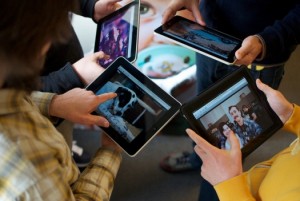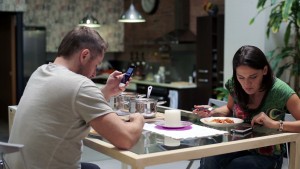Over 55% of British adults now own a smartphone. This figure is expected to rise to 69% in 2018. Since the introduction of the first smartphone 8 years ago smartphones have transformed how we communicate, how we consume media and how we are entertained.
In November 2007 the first iPhone invented by the late Steve Jobs went on sale in London The device cost £269 but Apple fans queued all night to become owners of the world first touch-screen smartphone that had apps and enabled high-speed internet connection.
The iPhone led to a revolution in the way we communicate. Despite the success of the iPhone it was beyond many peoples budget and Nokia continued to dominate the mobile phone market with their simple to use affordable devices until 2010 when their failure to innovate caused their downfall.
Driven be Apple's success other mobile phone manufacturers rushed to develop their own smartphones. From a limited range of high-end smartphones developed by big brand names, we now have a massive choice of smartphones to suit everyone's demands and budget.

 In 2012 a Daily Mail survey revealed that ¾ of smartphone users even use their smartphones whilst on the loo. This led to the term 'Boggers'. Whilst answering the call of nature 29% of respondents said they used their smartphone for entertainment and 78 % browse the internet. Respondents also watch TV, text and send emails from theirs smartphone whilst on the loo.
In 2012 a Daily Mail survey revealed that ¾ of smartphone users even use their smartphones whilst on the loo. This led to the term 'Boggers'. Whilst answering the call of nature 29% of respondents said they used their smartphone for entertainment and 78 % browse the internet. Respondents also watch TV, text and send emails from theirs smartphone whilst on the loo.
 Tablets too have become must-have devices. 5 years ago just 3.5% of Brits owned a table. Now 51% of British households have a tablet and 65% of Brits will own or regularly use a tablet by 2018. This could increase even further with the rise in business-focused tablets now available.
If you're thinking about getting your first smartphone or tablet and are looking for an affordable device, there is a wide range to choose from at OneTech Gadgets a UK online store that offers great customer service including live chat. Take a look at OneTech Gadgets latest deals and great offers here.
Tablets too have become must-have devices. 5 years ago just 3.5% of Brits owned a table. Now 51% of British households have a tablet and 65% of Brits will own or regularly use a tablet by 2018. This could increase even further with the rise in business-focused tablets now available.
If you're thinking about getting your first smartphone or tablet and are looking for an affordable device, there is a wide range to choose from at OneTech Gadgets a UK online store that offers great customer service including live chat. Take a look at OneTech Gadgets latest deals and great offers here.
What is driving the increase in smartphone ownership?

Lower priced smartphones
Smartphone prices have fallen dramatically due to increased competition and new players such as Xiaomi, ASUS and Lenovo entering the Smartphone market with stylish smartphones packed with great features. Its now possible to get a smartphone for under £100.Smartphones are great value devices
Based on how many times a day we use a smartphone against how much we paid for it, a smartphone is one of the best value devices of 2015.We spend more and more time on our smartphones
In a recent survey 50% of respondents said they check their smartphone 25 times a day; 16% of respondents check their smartphone 50 times a day and 12% of Brits check their smartphone as soon as they wake up and 55% within 15 minutes of waking up. In 2012 a Daily Mail survey revealed that ¾ of smartphone users even use their smartphones whilst on the loo. This led to the term 'Boggers'. Whilst answering the call of nature 29% of respondents said they used their smartphone for entertainment and 78 % browse the internet. Respondents also watch TV, text and send emails from theirs smartphone whilst on the loo.
In 2012 a Daily Mail survey revealed that ¾ of smartphone users even use their smartphones whilst on the loo. This led to the term 'Boggers'. Whilst answering the call of nature 29% of respondents said they used their smartphone for entertainment and 78 % browse the internet. Respondents also watch TV, text and send emails from theirs smartphone whilst on the loo.
Technological innovation
Smartphones have evolved to become full capacity computers in hand held devices which enable connectivity 24/7. Many smartphones now have built in Wi-Fi and 3G. Smartphones and tablets are replacing laptops as technological innovation enables them to do more and more stuff we used to do on laptops.4G connectivity is driving smartphone usage
Brits with 4G enabled smartphones are doing much more on their smartphones including; shopping, banking, watching TV and viewing HD videos. 4G smartphones are widely available and affordable. To check out OneTech Gadgets affordable range of 4G smartphones click here.Accessibility
Britain is becoming a smartphone-first web use country. Over 33% of Brits say their smartphone is the most important device for getting online; up from 22% in 2014. Smartphones have transformed the way we consume media and are now the first place most people turn to for news, information and entertainment.Mature smartphone users
Smartphone use amongst 55-64 year old age group has risen from 19% in 2012 to 50% in 2015. This age group are becoming more tech savvy and smartphones are becoming simpler to use. Tablets too have become must-have devices. 5 years ago just 3.5% of Brits owned a table. Now 51% of British households have a tablet and 65% of Brits will own or regularly use a tablet by 2018. This could increase even further with the rise in business-focused tablets now available.
If you're thinking about getting your first smartphone or tablet and are looking for an affordable device, there is a wide range to choose from at OneTech Gadgets a UK online store that offers great customer service including live chat. Take a look at OneTech Gadgets latest deals and great offers here.
Tablets too have become must-have devices. 5 years ago just 3.5% of Brits owned a table. Now 51% of British households have a tablet and 65% of Brits will own or regularly use a tablet by 2018. This could increase even further with the rise in business-focused tablets now available.
If you're thinking about getting your first smartphone or tablet and are looking for an affordable device, there is a wide range to choose from at OneTech Gadgets a UK online store that offers great customer service including live chat. Take a look at OneTech Gadgets latest deals and great offers here.




